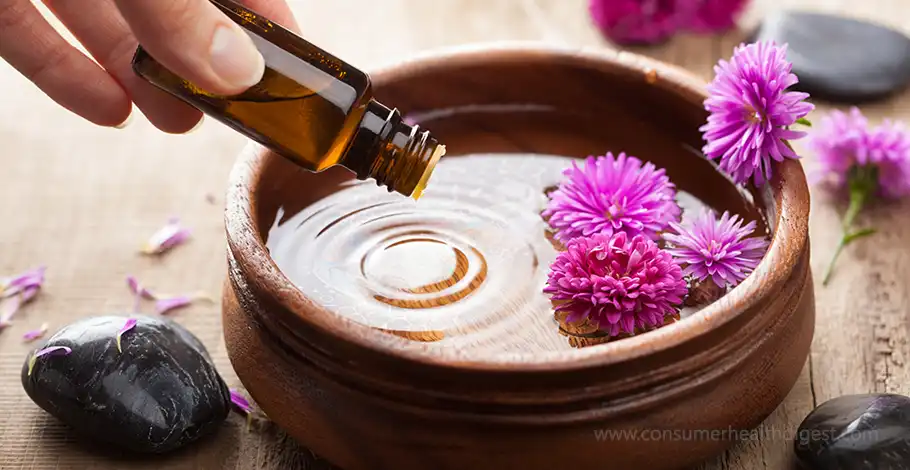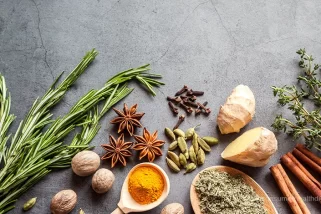In This Article
Overview
Finding the best essential oil is not an easy task. You might have heard of big brand names such as doTerra or Young Living or know someone who sells these oils to family members or friends.

The truth is that essential oils have been used for millennia, and now the growing popularity of natural and herbal treatments has led to an increase in the demand for essential oils.
But what does that mean?
What are the health benefits?
Are they safe?
How can we know if we are purchasing sustainable oils?
Let's start with the basics.
What are Essential Oils?
Essential oils are highly concentrated chemical compounds derived from a single plant or plant parts (flowers, roots, stems).[1] The oils are extracted via distillation—usually with steam or water—or expression, and the result is the “essence” or fragrance.
In the natural world, essential oils attract pollinators and facilitate the propagation of plants. But these aromatic substances fulfil a different purpose in the human body: making us feel good.
What Are the Essential Oils Benefits?
The therapeutic use of essential oils is known as aromatherapy. Every oil has its own unique fragrance, and if either inhaled or applied topically (always diluted), the natural compounds of the oils can have an effect on many parts of the body, from the skin's surface to underlying muscles.
When inhaled, essential oils have been proven to activate different parts of the brain that modulate behavior, generate energy, or promote relaxation.
Applied on the skin, some essential oils help with eczema, inflammation, arthritis and some can even be used as an antibacterial for small cuts or scrapes. In cancer patients, aromatherapy is used as supportive care.[2]
Diffusing essential oils can also protect you from airborne bacteria. This approach has been so successful that hospitals are now diffusing essential oils to protect patients and staff.
What are the Potential Risks Associated with Essential Oils?
Not knowing how to use essential oils can have grave health consequences, especially in children. The main question remains: are essential oils safe to consume? Scientists say no, but several brands still recommend some of their oils for ingestion.
The bottom line is that essential oils can cause serious poisoning. For example, eucalyptus, sage, and camphor oils are known to cause seizures if swallowed.
Essential oils can react with prescription drugs and supplements, and they can cause adverse reactions when used in excess.
They also behave differently with each person, so you must familiarise yourself with the safety precautions and contraindications of the oils before using them.
The most reported symptoms of toxicity are:
- Stomach-ache or other digestive problems
- Allergic reactions
- Skin irritations
How Should I use Essential Oils?
Certain oils can irritate the skin when used in high concentrations. That's why experts recommend that you do a small patch test first and always dilute the oil. If your skin reacts badly, remove the oil and don't use it again.
Dilution ratio, duration, and the recommended daily dose are three important things that you need to take into account before you apply an essential oil. If you are not sure if the amount you are using is correct, do a patch test first.
The safest way to use essential oils is to use a diffuser. Diffusing the oils is easy and a great way to reap their benefits. When using a diffuser, always:
- Choose a well-ventilated area
- Use a diffuser for about 30- 40 minutes (more potent blends should only be diffused for 20 minutes)
- Essential oils can be harmful to your pets, especially cats. Don't use the oils on your pets or diffuse them in a closed area that could harm them.
Where do My Essential Oils Come From?
Plants for essential oils can either be cultivated on a large scale or harvested from the wild (wildcrafting). Many essential oils are made from critically vulnerable, threatened, or even endangered plants—and when these are harvested in mass quantities from the wild, their population gets even smaller.
As responsible consumers, we need to make sure we're not buying oils from rare or endangered plants. Checking this is easy—just enter the genus and the species of any plant in the IUCN Red List of Threatened Species and it will tell you its ecological status.[3]
The essential oils that you should think twice before buying are:
- Sandalwood (Santalum album)
- Rosewood (Aniba Rosaedora)
- Frankincense (Boswellia sacra, B. carterii, B. frereana, B. serrata)
- Palo Santo (Bursera Graveolons, and Bulnesia Sarmientoi)
What to Watch Out for when Buying Essential Oils?
Misleading marketing terms
Essential oils companies have been known to make exaggerated claims about the benefits of their oils[4]. Two of the biggest brands have received warning letters from the FDA for claiming that their oils were “therapeutic” and intended for use in the cure, mitigation, treatment, or prevention of conditions including Autism, Ebola, cancer, Alzheimer's disease, and other conditions.
Companies use “therapeutic grade” to describe their essential oils, but no governmental agency “grades” or “certifies” essential oils as therapeutic. In other words, this is mostly a marketing term. Don't trust the label; instead, look for other indicators of the essential oil's quality, such as sustainable sourcing, GC/MS reports, and ingredients that are free from synthetics, contaminants, or fillers.
Multi-Level Marketing Companies
Multi-level marketing companies (MLMs) sell products to the public by word of mouth or direct sales. In other words, they make money by selling the products and recruiting more sellers.
The problem with MLMs is that they enable misinformation to spread like wildfire.
How?
Much of the information on essential oils comes from the distributors, but in many cases, they don't understand the dangers of highly concentrated chemicals and may claim medicinal benefits based on personal experience, not scientific data.
Conclusion
While not a cure, essential oils have been used for generations to manage stress-related symptoms. However, the essential oil industry is a complicated world where, in many cases, suppliers and companies obtain oils from farmers or brokers whose practises are sometimes questionable.
As a consumer, you might not be aware of those relationships and practices, but there are some important things to consider before purchasing an essential oil.
Whether you buy an essential oil in a store, from an individual seller, or from the internet, be sure to read the information provided on the label or website.
Look for the Latin name of the plant and the name of the country in which the plants are grown, and remember to contact the company directly if you have any questions.
More Resource:
4 Sources
We review published medical research in respected scientific journals to arrive at our conclusions about a product or health topic. This ensures the highest standard of scientific accuracy.
[2] Aromatherapy With Essential Oils: https://www.ncbi.nlm.nih.gov/books/NBK65820/
[3] IUCN Red List of Threatened Species : https://www.iucnredlist.org/
[4] Essential oils companies : https://pubmed.ncbi.nlm.nih.gov/34222588/







 This article changed my life!
This article changed my life! This article was informative.
This article was informative. I have a medical question.
I have a medical question.
 This article contains incorrect information.
This article contains incorrect information. This article doesn’t have the information I’m looking for.
This article doesn’t have the information I’m looking for.